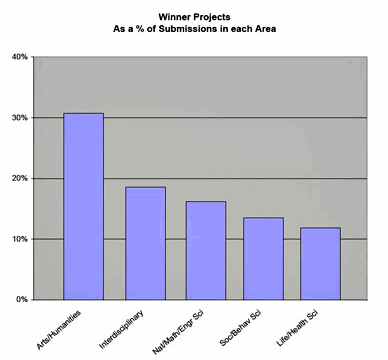Academic Darwinism
While research projects on campus used to be funded internally on an equal basis, now UWM is putting those projects in competition with each other for dollars. And even more than that, part of the selection process is based on how the proposed project can generate outside money through either private partnership or grants from the federal government.
Not surprisingly, the RGI has drawn some concern from scholars in the Arts and Humanities, who have much less access to private and federal money than those faculty members in the sciences.
As history professor Steve Meyer noted back in January: "The structure of the RGI proposal appears to privilege the sciences. Some of us skeptics will simply await the outcomes of the RGI process."
Well, the wait is over. All 45 of the RGI awards were just granted using the new application formula.
Take a look at this chart of the awards for this year. It comes from a story on the awards prominently displayed on the home page of the campus today.
And from the story itself: “The merit-based portfolio of selected projects is remarkably balanced in terms of discipline, with one exception: 31 percent of proposals in the Arts and Humanities were successful, substantially above the overall campus average of 16 percent.”
Based on this, you might think proposals from the Arts and Humanities faired quite well. Better, in fact, than the rest of the disciplines.
Not so. A look at the cumulative numbers tells a much different story.
There were 285 applications filed for the RGI funding and 45 were approved. Out of those 45 awards, a scant 9% went to Arts and Humanities proposals while the remaining 91% went to proposals from Life and Health Sciences (40%), Natural, Mathematical, Engineering, and Physical Science (29%), and Social and Behavioral Science (22%). Here's the complete list.
And the only reason a total of four proposals from Arts and Humanities were approved is because that many were earmarked prior to the application process to ensure the liberal arts weren’t completely left behind.
I certainly understand why the RGI was started. State funding for UWM, along with the UW System as a whole, has decreased substantially over the last few years and this is the only way to keep from decreasing the financial viability of all research projects on campus.
Survival of the fittest, you could say, but I prefer the moniker “Academic Darwinism.”
But understanding why it’s happening isn’t a reason to ignore the consequences.
UWM is still a public university. And a good portion of the students who attend UWM major in programs within the Arts and Humanities. When they come here, they expect to be taught by top-notch professors on the cutting-edge of research in their field. As we get further along into the RGI that may not be such an easy thing for the campus to ensure.



0 Comments:
Post a Comment
<< Home